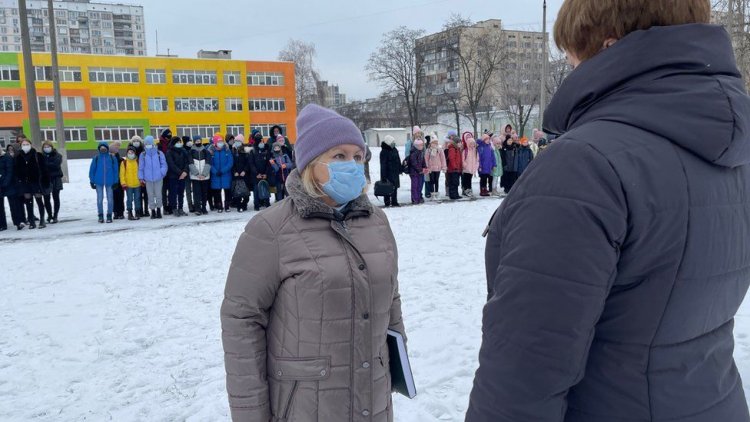Civilians In Ukraine Are Preparing For Battle As Invasion Fears Mount.
Simultaneously, metropolitan schools are practicing bomb scare or air raid drills, official directions to assembling an emergency "grab bag" for evacuation are circulating on social media, and individuals have begun mapping their escape route, which mostly entails driving west as quickly as possible.
Dmytro Dubas believed his fight was finally done. Now, the United States is warning of a full-scale Russian invasion of Ukraine, something the seasoned volunteer fighter cannot dismiss.
"I was quite troubled last week; I even sought treatment from my psychotherapist," he says.
Ukraine's Western allies have been warning about Russian forces massing on the border for months. This has spurred military analysts across the world to create countless maps with arrows predicting how Vladimir Putin's army will move on Kyiv.
Ukrainians who would be directly affected by such an invasion are significantly less optimistic.
However, the constant mention of conflict is frightening.
"Russia can always send soldiers to the border in a couple of days and then invade," Dmytro argues from his Kyiv apartment.
When fierce combat against Russian-backed troops erupted in 2014, he was working in sales and joined the torrent of volunteer fighters coming east. A nominal ceasefire has been in effect since 2015, although it is frequently broken, and the possibility of a rapid increase in bloodshed is always present.
Dmytro, on the other hand, had returned to civilian life, preserving mementos of his time in the trenches in an old ammo box repurposed as a coffee table in his living room.
He's now eased his concerns by preparing for the worst-case scenario: filling up his car with gas, stocking up on emergency food, and enrolling in the territorial defense force to sharpen his abilities.
Vladimir Putin has been blamed by Western intelligence services for a variety of schemes, including a besiegement of Kyiv. Ukrainian leaders, from President Volodymyr Zelensky on down, have snubbed the proposal, fearful of instilling panic.
Simultaneously, metropolitan schools are practicing bomb scare or air raid drills, official directions to assembling an emergency "grab bag" for evacuation are circulating on social media, and individuals have begun mapping their escape route, which mostly entails driving west as quickly as possible.
Even retirees have started attending weekend drills in the woods outside of Kyiv, where graffiti-covered concrete factory ruins serve as a makeshift battleground. Even if the guys are too old to sign formal contracts, military trainers do not dismiss them.
During a pause from kneeling on the ice and swiveling back and forth to train his rifle on an imaginary attacker, 61-year-old Vasyl Nazarov says, "I don't think the Russians will invade today owing to our Western allies sending us guns."
Because it's his first session, his "gun" is a wooden cut-out for the time being.
"I don't think they'll get to Kyiv," Vasyl continues, "but we have to be prepared."
Serhiy Kalinin agrees, tossing a cigarette butt into a snowdrift, "I hope the West's threat of horrible sanctions will stop Putin.
The 64-year-old needed a refresher course because it had been decades since he completed his obligatory military duty.
He declares, "The enemy is near our border." "As a result, everyone should be ready."
Russia's deployment of 100,000 troops to its border with Ukraine has suddenly become "subject number one" on the privately-owned Priamyi TV program.
Taras Berezovets, the show's host, calls Russian President Vladimir Putin "unpredictable" and expresses concern about Mr. Putin's "idée fixe" that Ukraine has never been an independent nation.
"Putin wants to prevent a nation from making its own decisions, as Soviet authorities did for decades in Eastern Europe," the journalist claims.
His personal life encapsulates some of the complexities of this conflict: he was born in Crimea, which Russia unlawfully invaded from Ukraine in the aftermath of major rallies in 2014 demanding stronger relations with Europe.

Mr. Berezovets, on the other hand, claims that his Russian ancestors do not make him pro-Moscow or a member of any so-called "Russian world."
"We made our decision in 2014, and it's clear: we don't want to be a part of the Russian empire," he declares emphatically. "Even if we have no prospect of joining the EU or NATO, our goal is to become a part of Western civilization, which includes the rule of law and freedom of expression. These are the things for which Ukrainians are willing to fight."
Despite Western intelligence assessments, Dmytro Dubas and his associates do not believe that a full-fledged conflict over Ukraine's future is imminent.
Just in case, the veterans have made arrangements to take their families to safety, as well as for deciding where the fighters will assemble and how they would be armed.
But, with that out of the way, they're back to business as usual, rather than a long-term danger posed by global factors they can't control.
At a gathering of close friends and colleagues in his kitchen, Dmytro shrugs and says, "It's a popular meme that the biggest issue for Ukraine is living next door to Russia."
A veteran volunteer recounts a slew of disasters that his nation has faced and overcome, ranging from the 1986 Chernobyl nuclear disaster through two revolutions and war in the east.
"It's usual in Ukraine for everything to be on fire," Artem says with a smile.
"You go insane if you think about war every hour of every day," another acquaintance, Yuliia, adds.
"After all, no matter how much we want to, we can't just pick up Russia and transfer it. It's our next-door neighbor, and we have to deal with it."

 Boakyewaa Lawrencia
Boakyewaa Lawrencia 


































